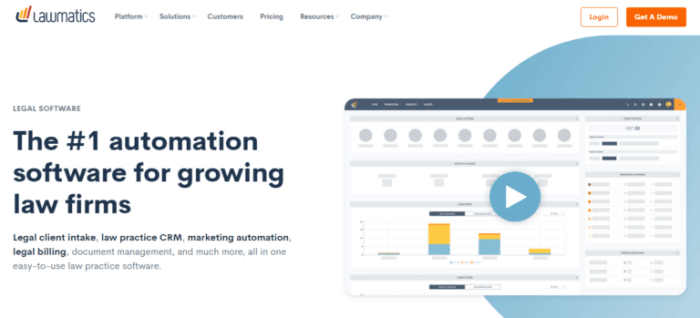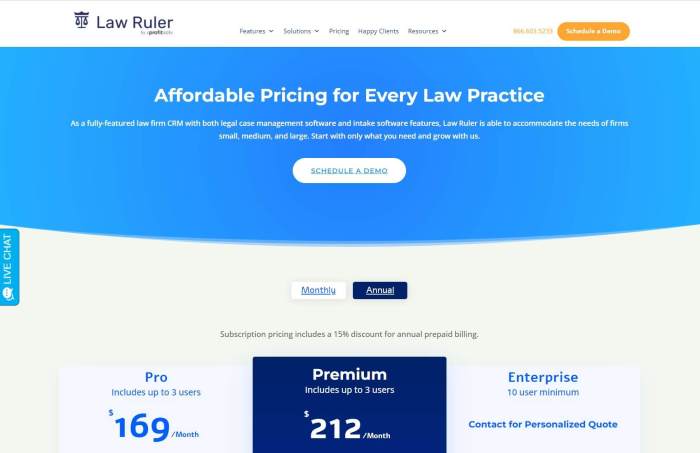Best crm software for law firms – Choosing the right Customer Relationship Management (CRM) software is crucial for law firms of all sizes. A robust CRM system can streamline operations, improve client communication, enhance case management, and ultimately boost profitability. This comprehensive guide explores the best CRM software options tailored specifically for the unique needs of legal professionals, offering detailed comparisons and insights to help you make an informed decision.
Understanding the Needs of Law Firms in a CRM
Law firms face specific challenges that necessitate a CRM system designed with their industry’s intricacies in mind. Unlike other businesses, law firms deal with sensitive client data, complex case management, stringent compliance requirements, and the need for seamless collaboration among team members. The ideal CRM should address these challenges by offering:
- Secure Data Storage and Access Control: Protecting client confidentiality is paramount. The CRM must adhere to strict data privacy regulations like GDPR and CCPA.
- Robust Case Management Capabilities: Tracking case details, deadlines, documents, and communication history is essential. The CRM should facilitate efficient workflow management.
- Client Relationship Management Features: Managing client interactions, scheduling appointments, tracking communication, and nurturing relationships are key for client retention and referrals.
- Document Management and Storage: Secure storage and easy access to legal documents are vital for quick retrieval and efficient collaboration.
- Time Tracking and Billing Integration: Accurate time tracking and seamless integration with billing software are essential for efficient billing and financial management.
- Collaboration and Communication Tools: Facilitating seamless communication and collaboration within the firm and with clients is crucial for efficient case handling.
- Reporting and Analytics: Data-driven insights into case progress, client interactions, and firm performance are valuable for strategic decision-making.
- Compliance Features: The CRM should help ensure compliance with relevant legal and ethical regulations.
Top CRM Software Options for Law Firms
Several CRM platforms stand out for their suitability to law firms. This section provides an overview of some of the leading options, highlighting their strengths and weaknesses:
1. Clio Manage, Best crm software for law firms
Clio Manage is a popular choice, known for its user-friendly interface and robust features specifically designed for law firms. It offers strong case management capabilities, integrated time tracking, billing, and client communication tools. Its strong focus on legal compliance is a significant advantage.
Pros: User-friendly interface, strong case management, integrated billing, excellent client communication tools, robust security.
Cons: Can be expensive, limited customization options for some users.
2. MyCase
MyCase provides a comprehensive solution for law firms, combining CRM functionality with practice management tools. It excels in streamlining workflows, improving client communication, and managing documents securely. Its intuitive design makes it easy to learn and use.
Pros: User-friendly interface, robust features, strong security, integrated billing and payment processing, excellent client portal.
Cons: Pricing can be a barrier for smaller firms, limited integrations with some third-party software.

Source: webfx.com
3. PracticePanther
PracticePanther offers a blend of CRM and practice management features, focusing on efficiency and ease of use. It’s particularly well-regarded for its time tracking and billing capabilities, making it a strong choice for firms needing strong financial management tools.
Pros: Excellent time tracking and billing, user-friendly interface, affordable pricing options, good client portal.
Cons: Fewer advanced features compared to some competitors, limited customization options.
4. CaseText
CaseText is a legal research platform that integrates CRM functionalities, providing a powerful combination for legal professionals. Its strong legal research capabilities are a significant advantage, streamlining legal research and improving the efficiency of case preparation.
Pros: Powerful legal research integration, good case management, strong document management features.
Cons: May not be the best choice for firms without a strong need for legal research integration.
5. CosmoLex
CosmoLex is a cloud-based practice management software that includes comprehensive CRM capabilities. It is designed to help law firms manage their entire workflow, from client intake to billing and reporting. Its focus on efficiency and automation makes it a strong choice for busy firms.
Pros: Comprehensive practice management features, robust reporting and analytics, good client communication tools.
Cons: Steeper learning curve than some competitors, can be expensive for smaller firms.
Choosing the Right CRM for Your Law Firm: Best Crm Software For Law Firms
Selecting the best CRM involves careful consideration of your firm’s specific needs and budget. Factors to consider include:
- Firm Size and Structure: A small solo practice will have different needs than a large corporate law firm.
- Budget: CRM software pricing varies significantly, so choosing a solution that fits your budget is crucial.
- Required Features: Prioritize the features most important to your firm’s workflow, such as case management, billing, client communication, and document management.
- Integration with Existing Systems: Ensure the CRM integrates seamlessly with your existing software, such as accounting and email platforms.
- Scalability: Choose a CRM that can grow with your firm, accommodating future expansion and increasing caseloads.
- User-Friendliness: The CRM should be intuitive and easy to use for all members of your team.
- Security and Compliance: Prioritize a CRM that offers robust security features and adheres to relevant legal and ethical regulations.
Frequently Asked Questions (FAQ)
- Q: What is the average cost of CRM software for law firms? A: The cost varies significantly depending on the features, number of users, and vendor. Expect to pay anywhere from a few hundred dollars per month to several thousand dollars per month for enterprise-level solutions.
- Q: Are all CRM systems cloud-based? A: Most modern CRM systems are cloud-based, offering accessibility from anywhere with an internet connection. However, some on-premise options still exist.
- Q: How long does it take to implement a CRM system? A: Implementation time varies depending on the complexity of the system and the size of your firm. Expect to allocate several weeks or even months for a complete implementation.
- Q: What are the key benefits of using a CRM in a law firm? A: Key benefits include improved client communication, enhanced case management, streamlined workflows, increased efficiency, better time tracking and billing, and improved client retention.
- Q: Can a CRM help with legal compliance? A: Yes, a robust CRM can help with compliance by providing secure data storage, access control, and tools for managing sensitive client information.
Conclusion
Choosing the right CRM software is a significant investment that can significantly impact your law firm’s efficiency and profitability. By carefully considering your needs and evaluating the available options, you can select a system that streamlines your operations, enhances client relationships, and positions your firm for continued success.
Call to Action
Ready to transform your law firm’s operations? Contact us today for a free consultation to discuss your specific needs and find the perfect CRM solution for your practice.
FAQs
What are the key features to look for in a law firm CRM?
Essential features include robust case management, secure client portals, document management, time tracking, billing integration, and comprehensive reporting capabilities.
How much does CRM software for law firms typically cost?
Pricing varies greatly depending on the features, number of users, and vendor. Expect a range from affordable monthly subscriptions to more substantial upfront investments for enterprise-level solutions.
Can CRM software integrate with existing legal software?
Many CRM systems offer integrations with popular legal software, such as practice management systems and e-discovery platforms. Check for compatibility before making a purchase.
What security measures should a law firm CRM have?

Source: contentmavericks.com
Data security is paramount. Look for systems with robust encryption, access controls, compliance with relevant regulations (e.g., HIPAA, GDPR), and regular security audits.
How can I determine the best CRM for my firm’s specific needs?
Assess your firm’s size, practice area, current technology, and specific requirements. Consider free trials or demos to test different systems before committing to a purchase.
